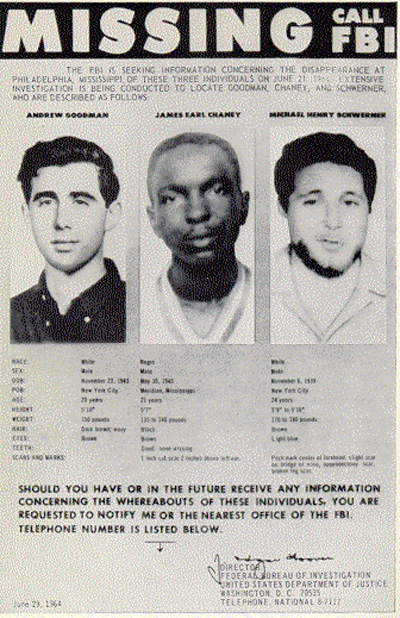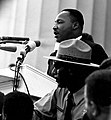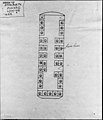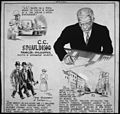Portal:Civil rights movement
The civil rights movement portal The civil rights movement was a social movement and campaign from 1954 to 1968 in the United States to abolish legalized racial segregation, discrimination, and disenfranchisement in the country. The movement had its origins in the Reconstruction era during the late 19th century and had its modern roots in the 1940s, although the movement made its largest legislative gains in the 1960s after years of direct actions and grassroots protests. The social movement's major nonviolent resistance and civil disobedience campaigns eventually secured new protections in federal law for the civil rights of all Americans. After the American Civil War and the subsequent abolition of slavery in the 1860s, the Reconstruction Amendments to the United States Constitution granted emancipation and constitutional rights of citizenship to all African Americans, most of whom had recently been enslaved. For a short period of time, African-American men voted and held political office, but as time went on Blacks were increasingly deprived of civil rights, often under the racist Jim Crow laws, and African Americans were subjected to discrimination and sustained violence by white supremacists in the South. Over the following century, various efforts were made by African Americans to secure their legal and civil rights, such as the civil rights movement (1865–1896) and the civil rights movement (1896–1954). The movement was characterized by nonviolent mass protests and civil disobedience following highly publicized events such as the lynching of Emmett Till. These included boycotts such as the Montgomery bus boycott, "sit-ins" in Greensboro and Nashville, a series of protests during the Birmingham campaign, and a march from Selma to Montgomery. At the culmination of a legal strategy pursued by African Americans, in 1954 the Supreme Court struck down the underpinnings of laws that had allowed racial segregation and discrimination to be legal in the United States as unconstitutional. The Warren Court made a series of landmark rulings against racist discrimination, including the separate but equal doctrine, such as Brown v. Board of Education (1954), Heart of Atlanta Motel, Inc. v. United States (1964), and Loving v. Virginia (1967) which banned segregation in public schools and public accommodations, and struck down all state laws banning interracial marriage. The rulings played a crucial role in bringing an end to the segregationist Jim Crow laws prevalent in the Southern states. In the 1960s, moderates in the movement worked with the United States Congress to achieve the passage of several significant pieces of federal legislation that authorized oversight and enforcement of civil rights laws. The Civil Rights Act of 1964 explicitly banned all discrimination based on race, including racial segregation in schools, businesses, and in public accommodations. The Voting Rights Act of 1965 restored and protected voting rights by authorizing federal oversight of registration and elections in areas with historic under-representation of minority voters. The Fair Housing Act of 1968 banned discrimination in the sale or rental of housing. (Full article...) Selected article -The Citizens' Councils (commonly referred to as the White Citizens' Councils) were an associated network of white supremacist, segregationist organizations in the United States, concentrated in the South and created as part of a white backlash against the US Supreme Court's landmark Brown v. Board of Education ruling. The first was formed on July 11, 1954. The name was changed to the Citizens' Councils of America in 1956. With about 60,000 members across the Southern United States, the groups were founded primarily to oppose racial integration of public schools: the logical conclusion of the Brown v. Board of Education ruling. The Councils also worked to oppose voter registration efforts in the South (where most African Americans had been disenfranchised since the late 19th century) and integration of public facilities in general during the 1950s and 1960s. Members employed tactics such as economic boycotts, unjustified termination of employment, propaganda, and outright violence. By the 1970s the influence of the Councils had waned considerably due to the passage of federal civil rights legislation. The councils' mailing lists and some of their board members found their way to the St. Louis–based Council of Conservative Citizens, founded in 1985. (Full article...)General imagesThe following are images from various civil rights movement-related articles on Wikipedia.
Related portalsWikiProjectsSelected biography -Mary Jane McLeod Bethune (née McLeod; July 10, 1875 – May 18, 1955) was an American educator, philanthropist, humanitarian, womanist, and civil rights activist. Bethune founded the National Council of Negro Women in 1935, established the organization's flagship journal Aframerican Women's Journal, and presided as president or leader for a myriad of African American women's organizations including the National Association for Colored Women and the National Youth Administration's Negro Division. She also was appointed as a national advisor to president Franklin D. Roosevelt, whom she worked with to create the Federal Council on Colored Affairs, also known as the Black Cabinet. She is well-known for starting a private school for African-American students in Daytona Beach, Florida. It later continued to develop as Bethune-Cookman University. She was the sole African American woman officially a part of the US delegation that created the United Nations charter, and she held a leadership position for the American Women's Voluntary Services founded by Alice Throckmorton McLean. For her lifetime of activism, she was deemed "acknowledged First Lady of Negro America" by Ebony magazine in April 1949 and was known by the Black Press as the "Female Booker T. Washington". She was known as "The First Lady of The Struggle" because of her commitment to promote better lives for African Americans. (Full article...)Selected image - Missing persons poster created by the FBI in 1964, signed by the Director J. Edgar Hoover. Shows the photographs of Andrew Goodman, James Chaney, and Michael Schwerner. All three were found to have been later murdered by local White Knights of the Ku Klux Klan, and the Neshoba County Sheriff's Office as well as the Philadelphia, Mississippi Police Department were involved in the incident. Did you know?
TopicsSubcategoriesThings to doAssociated WikimediaThe following Wikimedia Foundation sister projects provide more on this subject:
Discover Wikipedia using portals
|






















































